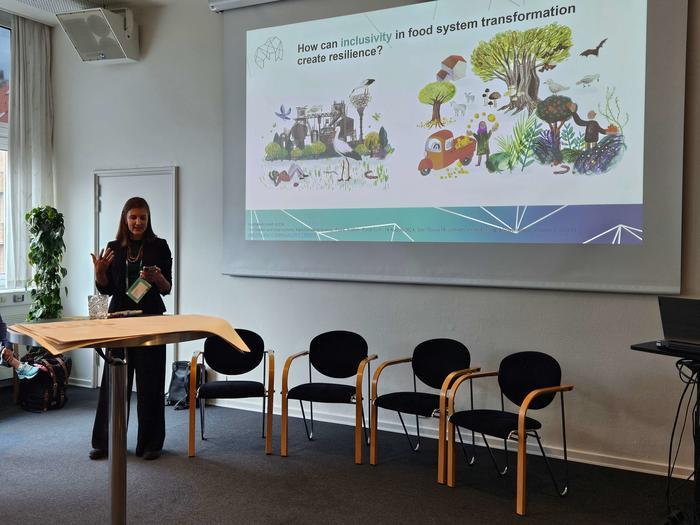
Inclusivity is the Backbone of Food System Resilience
Beginning of October 2024, FoodCLIC welcomed food system experts and enthusiastic participants to an engaging workshop, staged like a vibrant food market, at the 10th European Conference on Sustainable Cities and Towns (ESCT), which was co-hosted by ICLEI Europe and Aalborg Municipality. With various "market stalls" offering different perspectives on sustainable food systems — ranging from the food-and-climate connection to fair trade and local food networks—attendees dived deep into exploring how inclusivity can drive resilience in the transformation of our food systems. The workshop gathered a diverse group of stakeholders, including members of food policy councils, representatives from public administration and government, as well as researchers and food experts from across Europe, to discuss the vital role of inclusion. The setup encouraged lively exchanges, sparking valuable discussions on the future of resilient, sustainable food systems.
Key Outcomes of the workshop: Driving Change through Inclusivity
Inclusivity as the Backbone of Resilience
A key takeaway from the workshop was the recognition that inclusivity is essential for building a resilient food system. When all stakeholders—especially marginalized groups like small-scale farmers and vulnerable consumers—are involved in decision-making, the food system becomes more adaptable and better equipped to respond to crises. This involvement goes beyond representation: it includes shaping policies, making plans for the future, determining market access, and creating fair procurement processes to ensure no one is left behind.
Local Food Systems and Policy Mismatch
One of the challenges highlighted was the disconnect between local food systems and regulations. Local initiatives, such as community supported agriculture (CSA), sustainable farming and regional markets, often face barriers in aligning with larger, top-down policies. The workshop participants called for a rethinking of procurement regulations and creative solutions that allow local communities to stretch or adapt these policies to fit their needs. Empowering local systems through advocacy and greater flexibility at the policy level was seen as crucial for ensuring that local voices are heard and valued in the broader food system transformation.
Public Procurement as a Lever for Change
Public procurement was recognised as a tool for driving food system transformation. Participants noted that cities and towns could significantly impact the sustainability and inclusivity of food systems by adopting more creative and flexible procurement processes. Engaging local producers, implementing sustainable food sourcing for public institutions like schools, and improving tender criteria were suggested as ways to support local food economies while promoting healthier, more sustainable diets.
Bridging Urban and Rural Communities
The need to connect urban and rural communities in food system transformation was another outcome of the workshop. Participants called for more deliberate collaboration between these groups, noting that cities often serve as hubs for consumption while rural areas are the backbone of food production. Bridging this gap through platforms like Food Policy Councils (FPC) and community initiatives were seen as critical for fostering resilience. Especially FPCs were identified as key mediators in connecting stakeholders, enabling cross-sector collaboration, and ensuring that food policies are inclusive of both urban and rural needs.
Towards Action: Moving Forward
The outcomes of this workshop extend beyond discussion—they include tangible requests for action. One key ask was for cities to allocate more funding to support the work of Food Policy Councils. These councils are crucial in fostering inclusive decision-making and ensuring that food becomes a central topic across different policy sectors, including health and sustainability. Participants also called for more tools and platforms to engage local farmers, create short supply chains, and foster collaboration between urban and rural communities.
As the workshop concluded, the message was clear: transforming our food systems through inclusivity is not only essential for resilience, but it’s also an opportunity to catalyse broader change across health, sustainability, and governance. By embracing inclusivity, we can ensure that food systems are better prepared to weather the challenges ahead and create more equitable, sustainable futures for all.






Publishing date:
FOODCLIC. We are connecting people, food, policy & places.
FoodCLIC is a four-year project funded by the EU. The project runs from September 2022 to February 2027. The acronym FoodCLIC stands for 'integrated urban FOOD policies – developing sustainability Co-benefits, spatial Linkages, social Inclusion and sectoral Connections to transform food systems in city-regions

